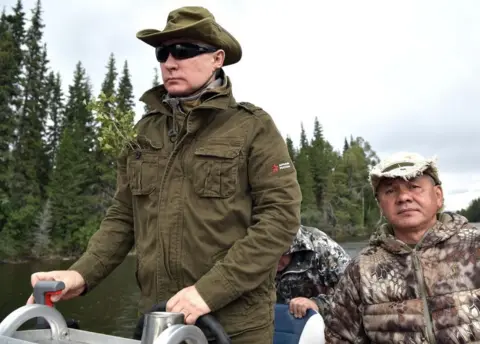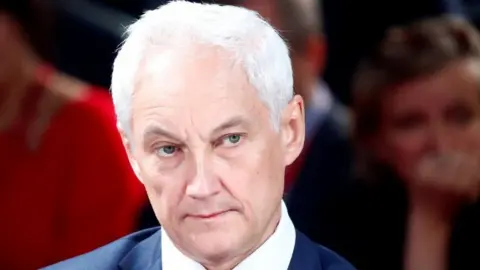
This article is more than
1 year old
Thought number one: whoever's sitting around the cabinet table in Russia, there's only one man taking the key decisions in the country - and that's President Putin.
In modern Russia the entire political system is constructed around him. It's worth keeping in mind when discussing who's in and who's out of the government. Central policy is unlikely to change.
Does that mean that a Russian government reshuffle isn't interesting, or significant?
No, it doesn't. Sergei Shoigu's departure from the defence ministry is fascinating on many levels.
After all - and this brings us on to thought number two - reshuffles are a rare thing in Russia. At least, as far as the most prominent political players are concerned.
Take Sergei Lavrov, Russia's veteran foreign minister. He's had the job for 20 years. Sergei Shoigu had been defence minister for 12 years (in that time, the UK has been through six secretaries of defence).
Mr Shoigu is considered a close ally of President Putin.
Cue to thought number three: being close to Putin, going on fishing and hunting trips with the president (yes, Sergei Shoigu did that - they even, famously, went mushroom-picking together), none of that is any guarantee you'll keep your job.

Sergei Shoigu has been replaced as defence minister by technocrat economist Andrei Belousov. Mr Shoigu hasn't been made redundant. He'll head the Russian Security Council in place of the hawkish Nikolai Patrushev.
But it doesn't feel like a promotion.
So why has a Putin loyalist been moved out of the defence ministry? Why has an economist replaced him? And what does this tell us about Vladimir Putin?
It's not a complete surprise. Rumours abounded that Sergei Shoigu could be sidelined. One of his deputies, Timur Ivanov, was recently arrested on corruption charges.
What's more, replacing Mr Shoigu with an economist makes sense, when you consider the huge amount of money the authorities have been pouring into Russia's war in Ukraine.
Defence spending in Russia has been ratcheted up to an estimated 7% of GDP. Increasingly it feels as if the Russian economy is being placed on a war footing.
There is a logic to having a defence minister who understands finances, economic planning and the need for efficiency - someone, too, unconnected to allegations of corruption currently under investigation.

But what's interesting is that Vladimir Putin chose this moment to make the switch. The president had stuck by Shoigu in 2022 when Russia was suffering military setbacks in Ukraine.
He'd stuck by him again in 2023 during the minister's very public spat with the late Wagner mercenary chief Yevgeny Prigozhin, who had accused Shoigu of corruption and demanded he be sacked.
Now, when Russia claims to have seized the initiative on the battlefield, the Kremlin leader has replaced his defence minister. It shows once again that Vladimir Putin doesn't like acting under pressure. He takes decisions at a time of his choosing.
But there is one more feature of a Russian government reshuffle. It always leaves you asking questions. There are plenty after this one.
So here we go.
What next for Sergei Shoigu? Can he carve out a new power base in the Security Council, or is it inevitable that in his new post his power will be vastly reduced?
What next for the man he replaces in the Security Council, Nikolai Patrushev? For a long time considered one of the most powerful men in Russia, will Mr Patrushev retain his influence? And in what guise?
Does the appointment of a new defence minister mean that, at some point soon, there'll be a new chief of the general staff in place of Valery Gerasimov?
Watch this space.